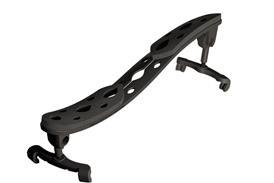In this article from The Strad August 2010, Catherine Nelson talks to musicians and medical experts about the risks and benefits of using beta-blockers to overcome performance anxiety, and why their use is still such a sensitive subject

I use beta-blockers every time I play a solo or first violin in a performing chamber group. Without it I don’t have control over my vibrato or my bow because my hands shake. I still hesitate to play solos but do not fear them as much as I used to.'
Violinist Dottie Goldfarb, from California, is just one of many players who have an intense, adverse reaction to performance stress, and for whom beta-blockers are a godsend, allowing them to conquer their fear enough to perform. A 1987 study showed that 27 per cent of US professional orchestral musicians were taking beta-blockers occasionally to control their nerves. In a US report in January 2010, a senior violin tutor from the University of Minnesota School of Music suggested that between 80 and 90 per cent of professional musicians take them before orchestral auditions. Evidence is anecdotal because there have been no recent studies in the US or Europe, but the trend for musicians to reach for the beta-blockers when under extreme stress is clearly on the up.
The use of beta-blockers by musicians is a controversial issue. On the one hand there are ethical questions: are the drugs equivalent to the performance-enhancing substances banned in sport, and do players who use beta-blockers in auditions therefore have an unfair advantage over those who don't? But then if beta-blockers enable excellent musicians plagued by chronic stage fright to perform and be heard, is that not a good thing? Beta-blocker use also brings with it possible health problems, and there's the danger that the medication could be habit-forming, leading to dependency and even addiction.
Despite the apparently widespread use of the drugs, the whole issue appears to be taboo. Of the professional orchestras I contacted who were prepared to comment on the subject, the Hallé and BBC Symphony orchestras both said that they had no information on whether their musicians used beta-blockers or not. 'We consider their use to be a personal choice to be made by the musician and their doctor,' said a spokesperson for the Hallé. A professional UK string player told me that though he'd never taken beta-blockers, he would only ever discuss their use in confidence with his closest friends. Everyone in the string world seems to know someone who’s taking them, but no one wants to talk about it.
The stigma attached to the drugs by some is all too familiar to Nick Roberts of the Coull Quartet. He and Donald Singer, a clinical pharmacologist at Warwick University and an amateur violinist, are studying how beta-blockers affect musicians' performance. 'I really hadn’t realised how sensitive the subject was until I talked to an orchestral colleague,' says Roberts. 'I was told that, for some, just the mention of beta-blockers might have a damaging effect on their playing.' Gerald Klickstein, performer, educator and author of The Musician's Way, feels that any disapproval levelled at the drugs is unfair on those who benefit from their use: 'I would like to see us destigmatise beta-blockers so that the musicians who are having on-stage difficulties and have tried many things that haven't worked can explore taking these drugs under medical supervision without feeling ashamed.'
The sensitivity surrounding beta-blockers stems in part from the ethical debate around them, and whether they should be regarded in the same bracket as, for example, anabolic steroids. Cellist Adrian Bradbury, who conducted a study in 2008 that looked at the effects of stage fright on cellists, is adamant that taking beta-blockers does not put users at an unfair advantage. 'I'd never judge a musician by their choice of stage-fright intervention – the judgement that really counts is how well they play, and if beta-blockers help someone to overcome stage fright then, medical safety permitting, so be it.'
So how do beta-blockers work? Singer explains that feeling nervous before a performance triggers an extra release of adrenaline – and other fight-or-flight response hormones – which in turn can cause string players to feel anxious and suffer a shaking bow arm. Beta-blockers can stop unwanted reactions to these hormones, such as an increased heart rate, and thus lessen detrimental effects of stress on the musician's performance (see below). Klickstein adds: 'Some people have a hair-trigger fight-or-flight response. Adult musicians who've had long-term issues with a tremor in their bow arm can often benefit from these drugs.' Beta-blockers can certainly be very effective in such situations, as Singer confirms. 'I know of a violinist who was so anxious and stiff during an audition that the bow simply flew out of his hand. Many professional musicians are worried by the stress of performance, and beta-blockers could help some of those performers control the debilitating physical symptoms of this stress.'
Singer does, however, underline the importance for musicians of working with a medical practitioner to ensure that, if a beta-blocker appears worth a trial, they take the right dose. He is very concerned by reports of players passing around pills in the pub. 'People are also increasingly turning to the internet to get hold of the drugs. At best these pills may be out of date; at worst they may be contaminated. Taking them without getting advice from a doctor can be very dangerous.
'Try a low dose under the advice of your doctor and work up if you need to, and always try them under rehearsal conditions first, as being made too relaxed or having unwanted effects could give a nasty surprise when your performance really matters. However, it's better to avoid medicines altogether if possible. The right amount of stress sharpens the concentration – a key part of the fight-or-flight response– and so can lead to improved performance.'
Do beta-blockers dull the expressivity of a performance? Roberts says: 'There's always the suspicion that taking them flattens the playing, so it loses emotional intensity. This is something we are hoping to look at in our study.' Klickstein, however, cautions against jumping to conclusions. 'Although some musicians report feeling less engaged while performing, others describe no adverse effects.' Preston Hawes, concertmaster and assistant director of the New England Symphonic Ensemble, is one such player. 'The side effects are minimal. With the right dose for me I do not get dozy, nor do I feel mentally or emotionally disconnected. With the adrenaline under control, I still feel the excitement of being on stage, but never the debilitating effects of muscle locks.'
Klickstein has been working for decades on reducing the tension inherent in performing by practising it as a skill like any other. 'Unfortunately, traditional instruction often focuses narrowly on how to play an instrument rather than on the holistic process of performing music,' he says. 'Much of my work is about filling the gap between what musicians typically learn in lessons and what they need to know to become fearless, artistic performers. That's not to say that all performance anxiety comes from a lack of skill and preparation. Some adult musicians with persistent stage nerves benefit from performance coaching in tandem with medical support.'
Singer, Bradbury, Roberts and Klickstein all agree that more debate on the issue of beta-blockers, and of dealing with performance nerves in general, would help. Bradbury says: ‘It would be good if it was discussed at student level, perhaps as just one of the possible range of strategies for dealing with stage fright.’ The Royal Academy of Music (RAM) in London seems to be among the few institutions willing to talk about the issue. The RAM’s Peter Craik explained that though the institution has no formal guidelines on beta-blockers, students can get advice from the health centre that works closely with the institution: ‘While acknowledging that beta-blockers are used in the profession generally, the centre’s staff discourage students on to this path on the grounds that there is a tendency to psychological dependency and addiction in the long term. Students who ask the centre for advice will generally be referred to talking therapies or to the mental training classes that are organised by the RAM and available to all students.’
Roberts suggests that a properly funded, anonymous survey of professional musicians on how they deal with stage fright would be a good step towards opening up debate on the subject. ‘We will over time try to take our study at Warwick University further, possibly monitoring musicians remotely during performance. But certainly, I was surprised at the strength of feeling and fraughtness when just discussing the subject of beta-blockers. We really need to find out more about them.’
How do beta-blockers work?
Beta-blockers, or beta-adrenoceptor blocking drugs, work by blocking transmission of certain nerve impulses. When you are frightened, anxious or under stress, impulses in the sympathetic nervous system (SNS) release adrenaline into the blood, and noradrenaline from SNS nerves. This stimulates adrenergic receptors in key parts of the body including the heart, brain, blood vessels and lungs. The beta type of adrenoreceptor then causes effects such as increased heart rate, tremors, higher muscle blood flow and sometimes loss of hearing and tunnel vision – known as the fight-or-flight response. For string players, stress caused by bow-arm tremor and sweaty palms can increase SNS hormone levels still further, so that the performer gets into a cycle of anxiety.
Beta-blockers do not lower anxiety directly, but help by reducing or stopping many symptoms of stress, because they prevent beta-receptors from being stimulated by SNS messages. Users report that they still feel nervous about performing, but the drugs prevent their body reacting to these nerves in a debilitating way.
Beta-blockers can, however, cause unwanted side effects. The heart rate can be slowed too much and the heartbeat weakened, making you tired, dizzy or faint. Cold hands and feet can be another problem for musicians, because beta-blockers can constrict small blood vessels, reducing circulation to the skin of the hands and feet. You can also become wheezy and short of breath because airways can narrow – for this reason, anyone with asthma should avoid taking beta-blockers. There have also been reports of beta-blockers causing tiredness, depression, impotence, sleep disturbance and nightmares.
Case studies
Christina Wilke
Violinist
‘My father was a professional trumpet player, and I had learnt what a beta-blocker was by the age of ten – to me they were normal. Almost all the wind and brass players I knew through my father had taken them for auditions and for concerts in which they had a major solo. With little performance experience, I took 10mg of propranolol for my undergraduate auditions. I still felt nervous and anxious, and I still had all my energy, but I didn’t have the shakes, the sweaty fingers or the knots in my stomach that I’d sometimes had. Throughout my undergraduate studies I decided not to use the drugs, so that I knew that if I was ever in a place without them, I wouldn’t panic. I didn’t even use them for graduate school auditions, although I have used them for recitals recently.
‘I know there is a lot of fear among string players that you can become dependent on beta-blockers. It’s true – you can. But I know players who are dependent on bananas – they eat five before an audition. I have never experienced a chemical dependency because I’ve used beta-blockers in moderation, taught myself how to perform without them, and when I do use them I know what to expect. In the past year I’ve taken two major auditions. One was with beta-blockers, and one was without (I had forgotten to refill my prescription). I didn’t advance in either audition, but I was proud of how I played in both.’
Preston Hawes
Concertmaster and assistant director of the New England Symphonic Ensemble
‘In 1995, when I was 13–14, I was performing the Saint-Saëns Violin Concerto no.3 quite regularly with orchestras around Canada, and I was fine. But when gearing up for performances of the Sibelius Violin Concerto I noticed that my bow arm would feel weak immediately after the initial adrenaline rush of being on stage. This got progressively worse until during a performance of the Beethoven Violin Concerto the following year, my arm went beyond the little shakes we all sometimes get: it suddenly locked up and I couldn’t move it.
‘I chalked that incident up to stage fright and began searching for a solution. I changed my diet, tried meditation, breathing exercises, waving my elbow while playing. But nothing helped and I nearly gave up performing.
‘I talked to a teacher about my symptoms after she had selected a challenging programme for me to perform. I told her about my muscle locks, heart palpitations, narrowing of vision, facial tics and even loss of hearing. She suggested I try a beta-blocker, and that suggestion saved my career. I’ve found that beta-blockers don’t stop me from being nervous, but manage my out-of-control adrenaline response. Also, my thought processes while performing are much sharper. I feel as though I can trust my body and mind enough to take musical risks I normally wouldn’t.’
Andrew Holland
Freelance violinist, New York
‘In high school, I started doing lots of auditioning for various youth orchestras. I got so terrified that I would fall apart in auditions. I remember repeating full sections because they came out so badly the first time and I had to ask for another chance.
‘I read about beta-blockers on web forums and asked my primary care physician about them. He was willing to prescribe a low dosage of propranolol for audition use only. Though I still had nervous thoughts, they didn’t seem to affect me physically. However, it went a bit too far at times – I remember feeling strangely disconnected from my body, as if it was responding a bit too slowly. But this seemed a very small price to pay.
‘After using beta-blockers occasionally for two to three years, my body seemed to be conditioned to remain relaxed during auditions. I stopped using them and noticed that my body remained calm during these and other public performances.’
Read: Study suggests orchestral first violins experience highest stress levels
Read: A quarter of orchestral musicians in constant pain, finds study


























No comments yet